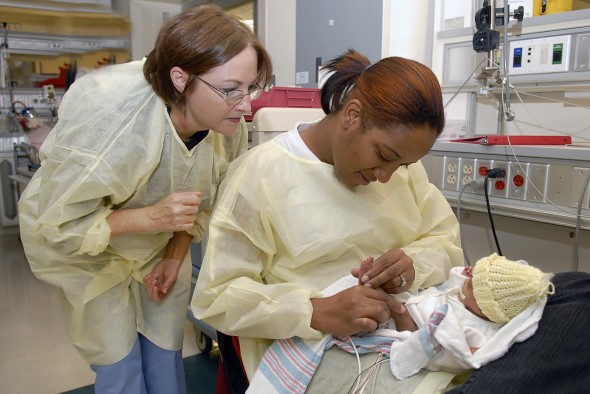Nursing researcher guides new moms of preemies

Rosemary White-Traut, left, professor emerita of nursing, developed a method to help mothers of premature infants have social interaction with their baby. Photo: Mark Mershon/UIC College of Nursing
Unlike premature babies, full-term infants let you know when they’re hungry.
“Baby wakes up, baby wants to eat,” said Rosemary White-Traut, professor emerita of nursing. “They may show sucking behavior, put their hands towards their mouths, or they may start to cry. They’re saying, ‘I’m here and ready to eat.’
“Preemies, however, will show very subtle pre-feeding behaviors such as opening their eyes or attempting to place their hands toward their mouths, and if the nurse does not see them, they’ll just go quietly back to sleep.”
During more than 30 years of research as a faculty member at UIC, White-Traut noticed that visiting mothers of premature infants would often just watch their sleeping babies, with no social interaction between mother and baby. She suspected that these babies were missing out on quality mother-child interactions. So she devised a preemie protocol, revising it each time she conducted a study.
“The mother begins by talking to her baby for 30 seconds, using infant-directed speech, or ‘motherese,’ raising the pitch of her voice and saying a few words each time she speaks to the baby,” White-Traut said. “Then she begins a moderate-touch massage. She also offers baby her face, engaging the baby in eye contact.”
The “intervention” lasts 15 minutes, with the mother talking and touching and looking at her baby for the first 10 minutes. The rest of the time she swaddles and rocks the child in her arms, continuing to talk and maintain eye contact.
Without the training, “mothers are challenged in being successful with oral feeding their babies,” White-Traut said. “The baby may only be able to be alert for a short period of time, and has very subtle pre-feeding cues.”
But preemies whose mothers learned the intervention were more alert before feeding and displayed more “pre-feeding behaviors” — bringing a hand to their mouths, sucking on a finger or sticking out their tongue. The babies were better at oral feeding, exerting more pressure on the nipple and sucking more times during a sucking “burst.”
“They gained significantly more weight and grew faster in length,” White-Traut said. “And we learned mothers were more confident in their ability to care for baby.”
‘My baby knows me’
In her latest study, she worked with mothers who had two or more environmental risk factors, including low education, poverty, minority status, or prior mental health problems. The research, funded by the National Institutes of Health and the Harris Foundation, was published in March.
She’s taught her method to preemie nurses around the city and across the country.
“It’s always rewarding to work with mothers and their babies, especially this vulnerable population,” she said. “I receive feedback from mothers about how wonderful this intervention is. When they come to visit their baby, they better understand that ‘This is my baby, and my baby knows me.’”
White-Traut grew up in Long Island. She earned her bachelor’s degree at Georgetown University and her Ph.D. at Rush University.
She’s been at UIC since 1983. Before becoming professor emerita in January 2014, she spent 15 years as head of the department of women, children and family health science in the College of Nursing. White-Traut works part-time at UIC and as director of nursing research for the Children’s Hospital of Wisconsin in Milwaukee.
Her husband, David Traut, is a retired vice president of Follett Higher Education Group, a provider of education technology, services and textbooks and other print and digital content, pre-K through college. Their daughter, Jennifer Traut-Todaro, 33, of Western Springs, is a structural engineer for the American Institute of Steel Construction. They have two sons: Michael, 31, of Chicago, global supply chain program manager in the Cardiac Rhythm and Heart Failure Group for Medtronic Inc., and Brian, 27, of Lemont, human resource manager with Interstate Warehousing.
She and her husband have a home in Hinsdale and two in Wisconsin, in Lake Geneva and Fontana. She raises flowers at all three.
“Gardening is a science,” she said. “The gardener needs to know about the soil, amount of moisture, sunlight and shade. Every spring is a new beginning for the garden.
“And it’s great exercise.”
